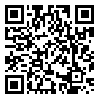BibTeX | RIS | EndNote | Medlars | ProCite | Reference Manager | RefWorks
Send citation to:
URL: http://journal.zums.ac.ir/article-1-2200-fa.html
Background and Objective: People with social anxiety lack enough self-assertiveness. The main goal of this study was to investigate the effectiveness of eclectic intervention approaches such as cognitive restructuring, cognitive coping skills and role playing on social anxiety and self-assertiveness among female students of the University of Isfahan. Materials and Methods: This experimental study was fulfilled with two experimental and control groups. The target sample comprised 32 students who were selected by several stages of cluster sampling out of 287 students of University of Isfahan. Initially, 2 questionnaires consisting of social anxiety and self-assertiveness scale were distributed among the students. Then, students with social anxiety and low scores in self-assertiveness scale were randomly selected and assigned into experimental and control groups. Subsequently, 10 sessions of eclectic intervention in the spring of 2012 were implemented for the experimental group. Social anxiety scale and self-assertiveness scale were completed in 3 stages: pre-test, post- test and follow-up for one month. Results: Results of covariance analysis revealed significant differences concerning social anxiety in experimental and control groups throughout post-test and follow-up stages and significant differences regarding self-assertiveness in experimental and control groups in post-test and follow-up stages. Conclusion: Findings of this study suggest that eclectic intervention (Cognitive Restructuring, Cognitive coping skills and Role playing Approaches) can be exploited as a beneficial approach to increase self-assertiveness and decrease social anxiety in students.
دریافت: 1392/3/30 | پذیرش: 1393/3/28 | انتشار: 1393/3/28
| بازنشر اطلاعات | |
 |
این مقاله تحت شرایط Creative Commons Attribution-NonCommercial 4.0 International License قابل بازنشر است. |




